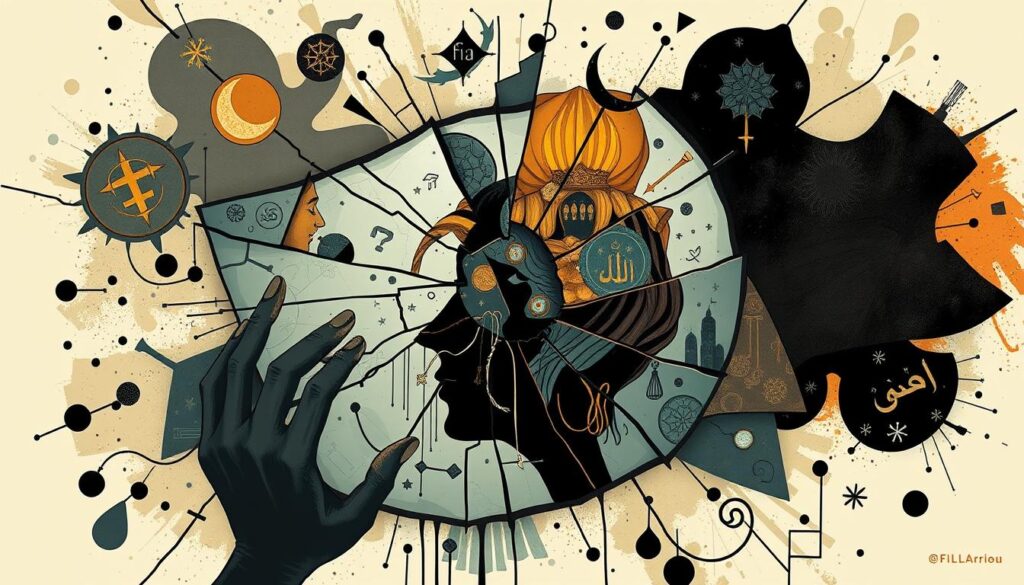Many Muslims today are affected by mental health stigma. This makes it tough for them to get the help they need. Over one in five U.S. adults battles with mental illness. This fact shows why we need understanding and kind healing.
Islam teaches us to see mental health as a mix of emotional, spiritual, and physical health. We take lessons from the Quran and Hadith to help others with empathy. By using faith and professional advice, we can change lives for the better.
We aim to overcome misunderstandings and false information about mental health. Let’s create a welcoming community where everyone feels supported. A place where faith and knowledge lead to healing.
Key Takeaways
- Mental health stigma is prevalent, affecting many Muslim communities.
- Over one in five adults in the U.S. experience mental health issues.
- Islam emphasizes seeking treatment and compassion in healing.
- Engaging in spiritual practices can significantly improve mental well-being.
- Open conversations can dismantle stigma and encourage help-seeking behavior.
- Education on mental health responsibilities lies with families and communities.
Understanding Mental Health in Islam
Understanding mental health in Islam shows us how it’s linked with spiritual health. Islam teaches a way of life that cares for both mind and spirit. Finding a balance between our emotional and spiritual health is key to our overall well-being.
Spiritual Well-being and Mental Health
Spiritual activities help with mental health, giving crucial support. Prayers and Dhikr make us feel peaceful and connected. These practices don’t just improve our spiritual health, they also lower stress and anxiety.
Being spiritual helps us stay strong through tough times. It gives us purpose and the strength to face challenges.
The Interplay of Faith and Mental Health
There’s a strong link between faith and mental health. Some Muslims think struggling with mental health means weak faith or punishment from Allah. But changing how we see mental health issues can help people get support. Understanding that it’s okay to seek help as part of our faith can reduce stigma. This makes a supportive environment where mental health is met with kindness.
We need to talk about the mental health challenges Muslims face. Knowing about mental health in Islam helps build communities that support both spiritual and mental health.
The Origins of Mental Health Stigma
Mental health stigma has its roots in culture and history, especially within Islamic communities. It’s key to know these origins to build empathy and understanding. Often, mental illness is seen as a sign of weakness or even mistaken for possession. This leads to shame and keeping quiet, which hinders understanding and support.
Cultural Perspectives on Mental Illness
In many places, including Islamic areas, mental health misunderstandings are common. Traditional views may push people with mental health problems aside. For example, a survey found that many with schizophrenia fear discrimination. They worry about getting jobs or making friends, showing the widespread stigma against mental illness.
Historical Context within Islamic Communities
Mental health views in Islamic communities have changed over time. Although Islam promotes kindness and support, there were times when harsher attitudes prevailed. Knowing this history helps us confront mental health stigma. Learning about these past views is a step towards change and healing. We aim for a future where everyone feels safe to seek mental health support, creating a healthier society.

Misconceptions Surrounding Mental Health
Mental health is very important in our communities. Sadly, many people believe things that aren’t true about it. These false beliefs spread myths. This stops people from getting the help they need and makes the stigma around mental illness worse. It’s important to correct these wrong ideas to create a supportive environment.
Common Myths in Islamic Contexts
There are some wrong beliefs about mental health that can cause harm. Some myths are:
- Mental illness is just a spiritual issue and prayer is the only solution.
- Getting professional help means you’re weak or don’t have enough faith.
- People with mental health problems are dangerous or not stable.
These myths get the facts wrong about mental health. They also stop people from being kind and understanding to those who are suffering. If we deal with these myths in Islamic communities, we can make things better for everyone.
The Impact of Misinformation
Misinformation about mental health has a big effect. It leads to stigma. This causes:
- Delays in getting help, which makes things worse.
- More chance of being treated unfairly at work or in social life.
- People feeling alone and without hope.
Studies show we need the right information to fight these bad effects. With better awareness, we can improve support for those facing mental health issues. This fights the harmful impact of wrong information.
The Role of Religion in Healing
Religion plays a key role in improving mental health, especially through Islam. The Quran’s teachings help in spiritual growth and healing wisdom. They teach believers to stay patient during tough times. This helps them understand and deal with difficulties.
Quranic Verses on Patience and Healing
The Quran stresses the importance of patience in overcoming hardships. For example, Surah Al-Baqarah (2:155) tells us that life’s challenges are tests. This view builds resilience and underlines religion’s role in healing. By looking to these verses, people gain strength and comfort, enhancing their mental health.
Seeking Forgiveness and Its Psychological Benefits
Forgiveness is key to mental well-being, offering both spiritual and mental peace. The pursuit of forgiveness, as Islam teaches, brings immense psychological rewards. It frees emotions and lowers stress. This process aids in healing as individuals let go of negativity for a happier life. The link between spirituality and mental health shows the vital role religion plays in healing.

Around 70% of Americans engage with faith communities monthly. This shows religion’s significant impact on mental health issues. With a close ratio of clergy to psychiatrists, faith leaders are often the first to help in mental health crises. This is especially true in less-privileged areas. Combining spiritual and psychological methods in mental health is critical. Studies show that strong religious beliefs can reduce stigma and encourage seeking help. Working together in mental health care, faith can greatly aid community healing.
For more insights into how religiosity influences seeking mental health care, visit this study. It explores the relationship between spirituality, stigma, and support in mental health.
Challenges Faced by Those Seeking Help
Many people find it hard to seek help for mental health issues. They worry about being judged by others in their community. This fear stops them from talking about their problems and seeking support. The stigma around mental illness often makes people feel alone, which hinders healing.
Fear of Judgment within the Community
The fear of being judged for mental health issues is strong. People worry about what others will think of their struggles. Misunderstandings about mental illness make this fear worse. We need a culture that understands and supports each other. Sharing real stories about mental health can help. It encourages people to seek help without fear.
Barriers to Accessing Mental Health Services
There are not just emotional hurdles; practical barriers also exist. How culturally aware professionals are can change how treatment feels. Some areas have too few resources, making it hard for people to find the help they need. Misconceptions about mental health make things worse. It’s critical to tackle these issues for better mental health care.
https://www.youtube.com/watch?v=tmViRIhxXLc
The Importance of Open Conversations
Talking about mental health openly is key to reducing stigma. It helps build a better community understanding. By talking about it in our families and communities, we make supportive spaces.
When we talk about mental health openly, we help those facing challenges. This makes support systems stronger.
Encouraging Dialogue within Families
Family conversations are really important in how we see mental health. We need to encourage sharing thoughts and feelings in families. This helps treat mental health issues as normal topics.
About 75% of people with mental health problems don’t seek help because of stigma. Talking in families can help overcome this. It makes everyone less scared and more supportive.
Community Initiatives to Foster Understanding
Community projects are great for raising mental health awareness. They create safe places for people to talk about what they’re going through. This can make people feel 37% less lonely, showing that talking helps in communities.
By participating in workshops and programs, community members show they care about mental wellness. This shows we’re all in this together when it comes to mental health.

The Role of Educational Institutions
Educational institutions, like mosques, are key in spreading mental health awareness. They offer a safe space for people to talk about mental health issues. By having mental health programs, they help everyone understand these issues better.
Mental Health Awareness Programs in Mosques
Starting mental health programs in mosques can make a big difference. They blend into mosque activities, building a support network. These efforts show the value of getting help and break down myths around mental illness.
- Raising awareness about mental health issues.
- Facilitating open discussions without fear of judgment.
- Providing resources for individuals in need.
- Creating supportive environments for families.
Workshops for Parents and Youth
Workshops for parents and kids are crucial. They give families the tools to discuss mental health. This helps recognize problems and improves how families talk about these issues.
- Empowering parents with knowledge on mental health.
- Teaching youth coping mechanisms and resilience skills.
- Highlighting the significance of mental health literacy.
- Encouraging positive relationships among family members.
| Program Type | Target Audience | Objectives |
|---|---|---|
| Mental Health Awareness Programs | Entire Community | Promote understanding and reduce stigma |
| Workshops for Parents | Parents | Equip with resources and skills |
| Workshops for Youth | Youth | Foster coping strategies and resilience |
Getting educational places involved in mental health education is vital. It fights stigma and supports those in need. Together, we’re building a healthier, more aware community.
Success Stories of Healing
Sharing success stories in healing shows how strong our community members are. By sharing stories from Muslim people, we start important talks on mental health. These stories give hope and show how getting help can change lives.
Real-life Experiences from Muslim Individuals
One person began dealing with mental illness at 26, leading to hospital care in Texas. The journey was hard, with job issues and problems with loved ones. But accepting the illness was a key step to getting better. They found support in hobbies and exercising.
Joining NAMI support groups was also crucial for recovery. It helped in sharing stories and supporting each other. This person also found coping strategies, like:
- Having hot showers
- Listening to uplifting music
- Watching inspiring TV shows
- Keeping a balanced daily routine
- Focusing on sleep and nutrition
- Exercising regularly to feel better
With therapy, about 70% of people learn to cope better. Talking about these journeys helps find common ground in struggles.

Community Leaders Advocating for Change
Community leaders play a crucial role in tackling mental health issues. Their work in promoting mental health care leads to positive changes. They help fight stigma and make it easier for people to find help.
Surveys show 1 in 4 adults face mental health challenges, showing the need for open talks. Support programs can greatly reduce loneliness. About 80% of those struggling feel alone without these networks. This shows the importance of leaders who create safe spaces for questions.
Let’s support and cheer each other on by sharing these healing stories. Celebrating these stories not only honors our experiences but also shows our community’s collective strength.
Compassionate Approaches to Treatment
The journey to mental wellness often includes spiritual beliefs and professional help. By using compassionate treatment methods, we create a caring community. This mix acts as a bridge, connecting faith with modern therapy, making healing better for us all.
Combining Faith and Professional Help
Faith is key in healing for many. Mixing Islamic principles with therapy offers a complete treatment that respects both spiritual and mental needs. This approach helps care for people, respecting their faith and supporting their mental health challenges.
Studies show that this mix makes a big difference. For instance, compassionate care has cut hospitalization rates for mental issues by 30%. Many experts argue for safe, trusting care environments, with 75% saying it’s crucial for good treatment. Merging faith with professional help brings deep, respectful healing.
Traditional vs. Modern Healing Practices
It’s important to mix Islamic traditions with modern psychology. Traditional counseling focuses on connection, empathy, and community. Modern techniques, however, focus on proven methods ensuring complete care.
This mix lets people seek help without losing their faith connection. One study shows strong support networks can lower distress. Encouraging both traditional and modern healing boosts emotional health and builds understanding.
| Aspect | Impact of Traditional Healing | Impact of Modern Practices |
|---|---|---|
| Connection to Faith | Encourages spiritual growth and community involvement | Supports evidence-based interventions |
| Patient Engagement | Utilizes familiar cultural practices | Promotes active collaboration in treatment |
| Emotional Regulation | Instills hope through faith-based support | Encourages coping strategies and resilience |
| Accessibility | Provides culturally relevant resources | Offers structured and systematic treatment options |
Merging traditional with modern treatments creates healing paths that resonate with our community, acknowledging faith’s role in mental health recovery. This collaborative approach enriches the healing journey with compassionate tactics leading the charge.
Building Supportive Communities
Creating supportive communities for mental health starts with empathy and active listening. When people feel understood, healing becomes easier. We need to make safe spaces for mental health talks. Places where everyone can talk about their challenges without fear.
The Power of Empathy and Listening
Empathy is key in supportive communities. We must listen to those with mental health issues. This builds trust. Support groups and open forums help people connect and share. They help break the loneliness of mental health challenges. By understanding different viewpoints, we make everyone feel included. It shows we’re not alone in our struggles.
Creating Safe Spaces for Discussion
It’s important to have safe spaces for mental health. These encourage open talks about struggles. Initiatives can offer support and mental health information. Workshops and discussions let people have real conversations. Sharing stories helps fight stigma and encourages seeking help. By promoting understanding, we make a secure and supportive atmosphere.

Our effort to build supportive communities shows our duty to help each other. It’s a step towards healing and harmony. We can inspire change and show compassion to those who need it.
Check out this resource for more on community ties: making meaningful connections.
Moving Forward: Strategies for Change
Looking to the future, bringing our community together to focus on mental health is vital. Many people suffer from mental health issues, but only a few in Muslim communities seek help. This fact shows we need urgent action. By pushing for better mental health resources, we make it possible for those struggling to find the help they need.
Advocacy for Mental Health Resources
To fight against the stigma, we must promote acceptance and understanding. Thanks to awareness campaigns, more people are now seeking mental health support. Together, we can fight stereotypes and make it easier for people to get help without feeling judged. It’s important for all of us to talk openly about mental health issues. This can make our communities stronger and healthier.
Promoting Acceptance and Understanding
Educating our communities is key to our advocacy. Talking about mental health can greatly increase understanding. Using respectful language helps reduce the stigma for those dealing with these challenges. We, as a community, need to take steps to make a change. By doing so, we create a place where taking care of mental health is part of overall well-being.






